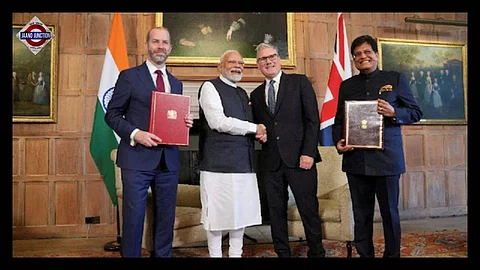

The newly signed Free Trade Agreement (FTA) between India and the United Kingdom is a significant deal that aims to greatly enhance bilateral trade, promising considerable advantages for Indian consumers through more affordable imported goods from the UK.
The agreement grants duty-free access for nearly 99% of Indian exports to Britain while also implementing substantial tariff reductions by India on a wide array of British products. This mutual lowering of trade barriers is anticipated to directly result in lower prices for numerous items available to Indian shoppers.
One of the most eagerly awaited categories to experience immediate price reductions is Scotch whisky. Currently facing a steep import duty of 150%, the FTA will immediately cut this tariff in half to 75% upon the agreement’s enactment.
Moreover, this duty will gradually decrease to just 40% over a decade. This significant tariff reduction will make premium British whiskies much more accessible and competitively priced for Indian consumers, who have long encountered high costs for these popular spirits.
Indian consumers will also benefit greatly in the automotive sector, especially with luxury and high-end vehicles manufactured in the UK. Customs duties on certain British-made cars, which can currently exceed 100%, are set to dramatically drop to just 10% under a quota system.
This will make sought-after brands like Jaguar Land Rover, Bentley, and Rolls-Royce far more affordable, potentially transforming India’s luxury car market. Although the exact quota details and timeline for these reductions will become clearer, the objective is to substantially lower prices.
Beyond these high-value items, the FTA will make a variety of other British products more accessible and affordable. Cosmetics and personal care products from well-known UK brands are expected to become more competitively priced due to reduced tariffs.
Similarly, everyday consumer goods such as chocolates, biscuits, and soft drinks from British manufacturers will also see their import duties lowered, offering more choice and potentially lower prices for Indian households.
In the healthcare sector, advanced British medical devices and health-tech equipment are set to become more accessible to Indian consumers and healthcare providers thanks to reduced import duties. This could lead to a wider availability of specialised medical tools and technologies at more affordable rates.
Overall, India has agreed to reduce or eliminate tariffs on approximately 90% of its tariff lines for British goods, with about 85% of these products becoming completely tariff-free over a ten-year period. This extensive reduction in average import duties on UK products, from around 15% down to an average of 3%, is intended to encourage increased trade and provide Indian consumers with quality British goods at more competitive prices, enhancing market choice and value.
